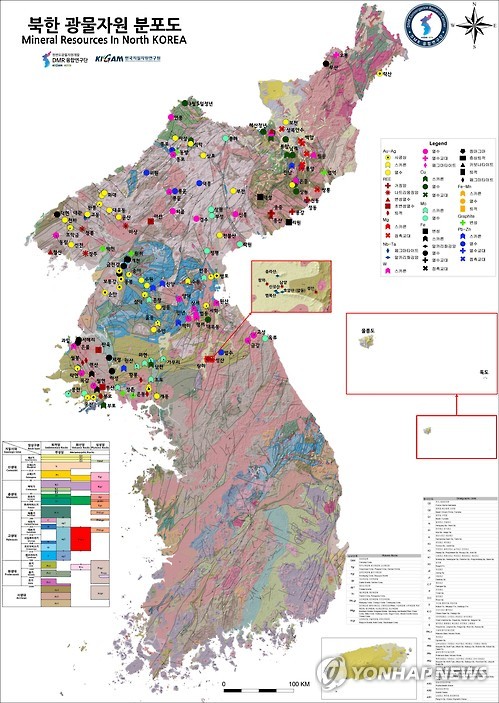- California Assembly OKs highest minimum wage in nation
- S. Korea unveils first graphic cigarette warnings
- US joins with South Korea, Japan in bid to deter North Korea
- LPGA golfer Chun In-gee finally back in action
- S. Korea won’t be top seed in final World Cup qualification round
- US men’s soccer misses 2nd straight Olympics
- US back on track in qualifying with 4-0 win over Guatemala
- High-intensity workout injuries spawn cottage industry
- CDC expands range of Zika mosquitoes into parts of Northeast
- Who knew? ‘The Walking Dead’ is helping families connect
N. Korea’s mineral reserves may be smaller than claimed: KORES
SEOUL, Oct. 21 (Yonhap) — Mineral resources continue to take up a large portion of North Korean exports, providing a valuable source of hard currency for the impoverished communist state. However, the country’s mineral reserves may be far smaller than it claims, South Korea’s public resources firm said Friday.
In 2015, North Korea’s exports of mineral resources to China came to US$1.34 billion, accounting for nearly 50 percent of the North’s overall exports that year, according to the state-run Korea Resources Corp. (KORES).
According to KORES, the North claims to have 22.7 billion tons of coal in reserve, along with 4.7 billion tons of iron, 28 million tons of zinc and 972 tons of gold.
The South Korean public firm, however, noted such claimed amounts were based on what it called calculating standards of socialist nations, which apparently tend to greatly inflate a country’s wealth.
“Based on international standards, North Korea’s actual natural resources reserves may be at 12 to 36 percent of what the North claims them to be,” KORES said in a symposium jointly held with Halla University in Wonju, Gangwon Province.
“North Korea’s natural resources, believed to be much greater in size than those of South Korea, are often considered an asset that can ensure joint development of the North and the South following a reunification of the two countries. But since North Korea’s natural resource reserves may be significantly smaller than the country claims, a more accurate understanding of such assets is necessary,” it said.
For instance, the German government had believed it could generate up to 300 billion euros by selling state-owned mines of former East Germany following the German unification. Instead it ended up suffering a 125 billion euro loss due to apparently inflated reserve estimates of the former East German government, KORES noted.
Currently, North Korea has 728 mines, including 241 coal mines, according to KORES.












